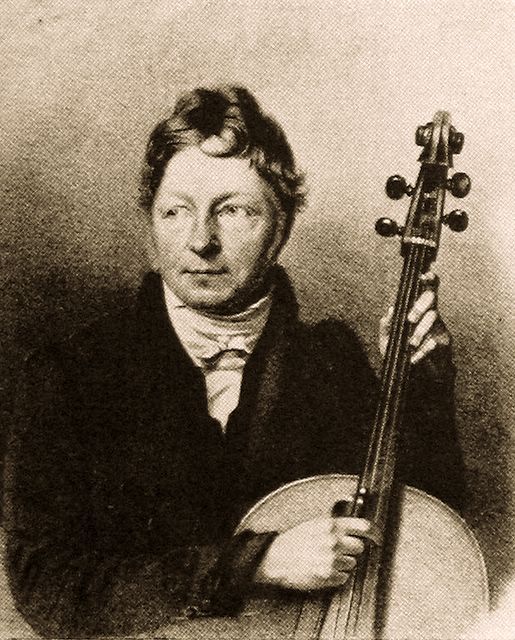Introduction
Bernhard Romberg, a renowned German cellist and composer, left an indelible mark on the world of classical music. His virtuosity on the cello, coupled with his innovative compositions, made him a prominent figure in the late 18th and early 19th centuries.
Early Life and Musical Education
Bernhard Romberg was born on November 13, 1767, in Dinklage, a small town in northwestern Germany. He came from a musical family, with his father and grandfather both being musicians. Recognizing his son’s talent at an early age, Romberg’s father, Andreas Romberg, began teaching him the violin and piano.
At the age of nine, Romberg was introduced to the cello by a traveling cellist who visited his hometown. Enthralled by the instrument’s rich and resonant sound, Romberg decided to pursue the cello as his primary instrument. He soon became known for his exceptional bowing technique and expressive playing style.
Breakthrough as a Performer
Romberg’s talent quickly caught the attention of prominent musicians. Because of this, he was invited to perform in various cities across Europe. In 1788, at the age of 21, he embarked on a concert tour that would establish his reputation as a virtuoso cellist. His performances captivated audiences with their technical brilliance and emotional depth. Hence, earning him widespread acclaim.
During his concert tours, Romberg had the opportunity to collaborate with renowned composers and musicians of the time, such as Ludwig van Beethoven and Franz Schubert. These collaborations not only enriched his musical experience but also influenced his own compositions.
Compositions and Musical Style
As a composer, Romberg contributed significantly to the repertoire for the cello. His compositions range from solo works to chamber music and concertos. Romberg’s compositions for the cello showcase his profound understanding of the instrument and his ability to bring out its expressive qualities.
Romberg’s musical style can be characterized as Romantic, with influences from the Classical era. His compositions often feature lyrical melodies, intricate harmonies, and virtuosic passages that highlight the technical capabilities of the cello. Romberg’s works maintain a perfect balance between technical brilliance and emotional depth, captivating both performers and audiences alike.
Notable Works
Some of Romberg’s most notable works include his concertos for cello and orchestra. These concertos demonstrate his mastery of the instrument and his ability to create captivating melodies and harmonies. One of his most famous concertos is the Cello Concerto No. 4 in E minor, Op. 7, which showcases his virtuosic cello playing and compositional prowess.
In addition to his concertos, Romberg composed numerous chamber music works for the cello. His sonatas, duets, and quartets for cello and piano are renowned for their musicality and technical challenges. These chamber music compositions highlight Romberg’s ability to create intricate musical dialogues between instruments.
Teaching and Pedagogy
In addition to his performing and composing career, Romberg was also a dedicated teacher. He held various teaching positions throughout his life, including positions at the Cologne Conservatory and the Paris Conservatory. Furthermore, Romberg’s teaching methods emphasized technical precision, musical interpretation, and the development of a personal playing style.
Romberg’s pedagogical works, such as his “New Method of Violoncello Playing,” have become standard repertoire for cellists around the world. These instructional books provide a comprehensive guide to cello technique, offering valuable insights into Romberg’s approach to playing and teaching the instrument.
Legacy and Influence
Bernhard Romberg’s contributions to the world of music continue to be celebrated and revered today. In fact, his virtuosic cello playing, innovative compositions, and pedagogical works have had a profound impact on the development of cello technique and repertoire.
Romberg’s influence can be seen in the works of later composers and cellists. His expressive playing style and technical innovations inspired generations of musicians. Thus, shaping the way the cello is played and understood. Many of his compositions are still performed and recorded today, ensuring that his musical legacy endures.
Collaborations
-
Ludwig van Beethoven
Bernhard Romberg’s collaboration with Ludwig van Beethoven, one of the most influential composers in the history of music, was particularly noteworthy. Beethoven, a pianist and composer, shared a close musical relationship with Romberg. Their collaboration resulted in mutual artistic inspiration, with Romberg’s virtuosic cello playing complementing Beethoven’s innovative compositions.
-
Franz Schubert
Another significant collaboration was with Franz Schubert, an Austrian composer known for his lieder and symphonic works. Romberg’s interaction with Schubert, who was a prodigious talent in his own right, led to a fruitful exchange of musical ideas. This collaboration likely influenced Romberg’s compositional style, as Schubert’s melodic richness and harmonic inventiveness left a lasting impression on Romberg’s works.
Conclusion
Bernhard Romberg’s life and musical career exemplify the transformative power of music. His virtuosity on the cello, coupled with his innovative compositions and dedication to teaching, have left an indelible mark on the world of classical music. Romberg’s contributions continue to inspire and influence musicians, ensuring that his legacy as a musical virtuoso lives on.

